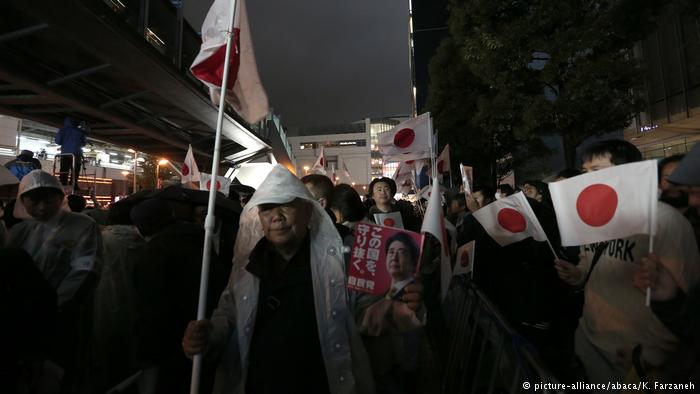
Japanese Prime Minister Shinzo Abe’s ruling coalition is set for a two-thirds majority in Sunday’s election, according to exit polls. Abe says his imminent task is to deal with the crisis over North Korea.
Prime Minister Abe said his victory in national elections had hardened his resolve to “firmly deal” with North Korea after its recent nuclear and missile tests that angered Pacific region neighbors and prompted extra UN sanctions.
“For that, strong diplomacy is required,” said Abe who has in past months courted both US President Donald Trump and Russian President Vladimir Putin.
The prime minister had called a snap election in roder to strengthen his mandate to deal with threats to Japan, including that of North Korea.
As results emerged, a cabinet spokesman said Abe and Trump had spoken by telephone and agreed to raise pressure on Pyongyang.
Near complete projections showed Abe’s Liberal Democratic Party (LDP) and junior coalition partner Komeito on course to win at least 312 seats in the 465-seat lower chamber of parliament.
Photographers watch a TV report about exit poll results
What the result means
The two-thirds majority would allow Abe to proceed with debate he has long sought on amending Japan’s post-World War II pacifist constitution.
It also means a likely continuation of the policies Abe has pursued since taking office in 2012, including:
Tokyo’s benchmark share market extended its record streak by one percent on Monday, reflecting Abe’s trademark “Abenomics” strategy of loose monetary policy and high government spending – despite doubts held by many voters.
Abe had vowed to use a planned sales tax hike to fund free childcare and thereby encourage more women to enter Japan’s workforce.
“I think the results reflected the voters’ preference for a solid political foundation and their expectations for us to push polices forward and achieve results,” Abe told national broadcaster NHK.
The victory boosts Abe’s prospects of securing another three-year term as leader of the LDP next September. This could extend his reign as prime minister until 2021, which would make him Japan’s longest-serving head of government.
Supporters of the ruling Liberal Democratic Party attend an election campaign rally
A weakened opposition
National media such as the Asahi newspaper attributed Abe’s win to a weak opposition and lack of convincing rivals. Some 51 percent of voters distrusted Abe, according to a survey run by Kyoto News.
“People are reluctant about Prime Minister Abe, but then who would you turn to? There is no one,” said Tokyo Gakushuin University professor Naoto Nonaka.
Heading the opposition with at least 54 seats will be the Constitutional Democratic Party (CDP) led by former chief cabinet secretary Yukio Edano.
Tokyo mayor Yuriko Koike adresses crowds on election night
Projected to be on 49 seats was the opposition Party of Hope, formed only weeks before the poll by Tokyo Governor Yuriko Koike.
Speaking from Paris, where she was attending consultations between big cities, Koike described her party’s result as “very severe” and said she took full responsibility.